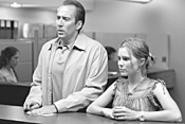When Nicolas Cage plays still and sullen -- a man possessed by self-loathing and melancholy in Adaptation, say, or the landlocked angel in City of Angels -- he comes off as drowsy. He disappears into those roles like a head plopped in a fluffy pillow, and it doesn't quite suit him. Cage has excelled in the more hyper parts that allow him to gesticulate like a spastic -- the ones where he gets to detonate like a bomb. There's something hypnotic about Cage when he's allowed to unleash his barely concealed inner lunatic -- in the casino scene in Honeymoon in Vegas, where Sarah Jessica Parker confronts him about his piss-poor card playing, or his grandstanding, arm-flailing monologues in Face/Off, before he becomes a gloomy John Travolta.
The part of Roy in Ridley Scott's Matchstick Men is perfect for Cage: He's a chain-smoking collage of nervous tics and obsessive-compulsive habits and intemperate outbursts, and he's especially frustrated by his inability to control his neurosis and function without his doctor's magic pills. It's hard to be a con man -- rather, a con artist, as he asserts with pride -- when you're more concerned with a spilled beverage than the swindle at hand.
Among Roy's most exasperating traits is his inability to control the twitching in his left eye; it looks as though he's always winking at someone, giving something away. It's a perfect mannerism for a movie about putting one over on someone who should know better -- the audience, in this case, since anyone going into a movie populated by grifters should know well in advance that what lies ahead is a double-double-cross. The joy in watching a film like this one is seeing how capably it's pulled off -- whether we're happy to lose our spare change to a hustler's well-executed card trick or leave the theater feeling cheated. Roy is just reminding the audience to keep alert -- a practitioner of the short con, the taking of small money from dupes and dopes, keeping us alert for the long haul.
Scott -- working from a script by Ted Griffin (Ocean's 11) and his brother Nicolas, who more or less faithfully adapted Eric Garcia's 2002 novel -- seems relieved not to be burdened by gladiators, serial killers, and crashed helicopters. This is his most intimate, most human picture since Thelma and Louise -- a movie about relationships in which people aren't killed, merely crushed a little by the seedy-greedy lives they've chosen. Scott has fun, to a point -- at least till his clever grin gives way to the unnecessary sweet smile.
Roy plays mentor to partner Frank (Sam Rockwell), the more voluble and ambitious of the two; Rockwell's still channeling Chuck Barris, still moving around like he's got a bebop soundtrack no one else hears. Gumming up their relationship is Angela (Alison Lohman), who shows up one lovely afternoon claiming to be Roy's 14-year-old daughter, the sole remaining proof that he was once married and capable of relationships that didn't involve swindling people out of their hard-earned cash. Then there are the ancillary characters -- Roy's new therapist, Dr. Klein (Bruce Altman), and moneyman Chuck Frenchette (Bruce McGill), plotting his own scheme -- who become key players in the search for a big score.
Garcia's novel played like a hipper, flipper Paper Moon: Roy's never so happy or calm as when teaching Angela how to take suckers for $300 or $30,000. Roy has no idea how to be a father, but feels inexplicable pride when he discovers this little girl's a great grifter. When Angela's around, Roy even stops twitching and obsessing over a clean house or an open door. Her presence calms him -- never more so than when he no longer has to lie about being an antiques dealer, his cover story that no one really buys. Angela seems genuinely happy to have a long-lost dad; Lohman plays her as all smiles and affectionate kisses, a skateboarding Kewpie doll in need of some fatherly attention.
But the Griffins have softened Roy, made him more likable for a wider movie audience: His cons are less callous, and his tics are the result of repressed guilt over his chosen profession. He even makes Angela give the money back to a woman they've taken in a laundry; in the novel, Roy figures if people are stupid enough to hand over their cash, they're not worthy of having it in the first place. They've also added a love interest the book never suggested: Sheila Kelley, as a woman working the checkout counter at the grocery store where Roy buys only cans of tuna and packs of smokes.
And that's where the movie falters: It tries to give Garcia's book a heart and conscience it didn't need and never demanded. His novel wasn't about redemption or even reconciliation, but the need for those things and how striving for doing "better" can finally dupe anyone -- how being good, in other words, can be bad for your health. Scott finally comes off as someone too guilty to have a good time. He seems to believe there has to be meaning to the swindle, and sometimes all we want is to have our pockets picked.










